#history of prostitution
Text
Thinking about how Victor Hugo wrote one of the most famous portrayals of prostitution that is sympathetic to the prostituted woman (Fantine from Les Miserables) and shows how she is forced by poverty to sell her body, how it clearly is a traumatic experience, and how much disrespect the pimps have for her in reality... And yet he continued constantly visiting brothels and using the women's bodies - so much so that a very famous rumor was created that all the brothels in Paris closed down to mourn him after his death... Kill all men?
#not to pretend Fantine's character is the epitome of sympathy though (lolz) but it makes me feel insane#like he literally KNEW they were only there because of being forced (sexually or economically or socially) but he DID NOT CARE#like........#mine#history#radblr#victor hugo#les mis#anti prostitution#🐝#hall of fame
2K notes
·
View notes
Text
"Prostitution was illegal in most places, but the fines levied on prostitutes provided a steady income for towns (as they still do). Many approved of brothels to curb male rampages. Between 1436 and 1486, for example, gangs of young men, mostly the sons or servants of residents, preyed on Dijon women. They broke into the houses of spinsters, widows, or wives whose husbands were away to rape them, sometimes dragging the women through the streets to an empty house where they kept them for days, repeatedly raping them. City officials solved this problem by setting up municipal brothels. They filled them with the women who had been assaulted in the gang rape."
-p.43 of 'From Eve to Dawn, A History of Women in the World, Volume II: the Masculine Mystique' (French, Marilyn)
651 notes
·
View notes
Text

I cannot believe we both lived to see this side of 30 🥹
#lindsay lohan#recovery#lohanaissance#lohan#prostitution whores get it#iconic#girl history#fire crotch#may i be burned at the stake for the tag#tags matter tho
29 notes
·
View notes
Text
I read a book a while back about the erotic appeal of 'women with penises' (don't close the page yet I promise it's useful). the book was called Ambisexuality. it's basically two things, a history of the sexual fantasy of a 'woman with a penis' and a study of transgender women sex workers in australia. content warning for sex work and children forced into sex work.
in the history portion, one of the things it talks about is how it seems that prepubescent boys who enter the sex industry in some cultures are basically taught to perform femininity. dressed like women, taught to dance like women, perfume themselves like women, basically appear cosmetically like a woman. since prepubescent boys don't look too different from girls, many adult heterosexual johns found this attractive. the presence of the penis was considered a positive, because male customers knew how a penis worked and could understand it. from the book:
References to the training of older boys and young men, in the twin arts of seductive dancing and sex work, can be found in many historical religious texts, not just of Afghanistan but as an aspect of cultures in many cities in South Asia and the Middle East until modern times.
[...] The historical record also provides clues that the link between feminised males and sex work even existed in some hunter-gatherer societies. In North America, the journalist and critic, Peter Ackroyd suggests that some native Indian societies accommodated feminised male sex work. The Pueblo Indians for example, maintained a mujerado, a 'trained male prostitute' in each village, who identified as a 'man-woman, not as a male [source mine]. Similarly, records suggest that the berdache were males who took on the roles of wife, communal concubine, prostitute and participant in certain sexual rites of native Indian tribes. The berdache wore women's clothing, did women's work and in sexual relations with their male partners, behaved like women as far as possible.
Many Roman brothels offered boys of different races, skin colours and professional abilities. Boys from the Middle East, for example, were prized for their dancing abilities and exotic appearance, while boys from Northern Europe were valued for their bawdiness and sensuality.
Some brothel owners refined the process of procuring, raising and training very young boys to an art form. Boys considered to possess the appropriate attributes were purchased as young as two or three years of age and were raised and trained by their owners. Their sole purpose in life was to entertain men and pander to the sexual tastes of wealthy clients. Many of these boys were feminised during their training. They were beautifully groomed and perfumed, had unwanted body hair removed and wore their hair long and curly. Some were trained to perform for their clients - as dancers, mimes, singers and storytellers. All were trained in fellatio, sodomy and analingus.
it's disturbing to think about how femininity is conflated with being attractive to men, so much that you can take a prepubescent boy, dress him up like a woman, and apparently plenty of people go "yeah, this is the perfect sex object, like a woman but better."
it also had a section on how trans women and gender non conforming men who dressed femininely across the world were basically often forced into prostitution. since they could not find employment due to their gender nonconformity, the only place they could get money was as prostitutes. being feminine dressed also meant they could make more money than gay male prostitutes who dressed in masculine style. from the book:
According to some cultural historians, the reason why the xanith presented as women was to enable them to make a living from sex work. As will be seen later, the suggestion that this lifestyle is driven by 'economic necessity' probably belies a considerable degree of individual choice in the matter. For many, the rewards of sex work led to a comfortable lifestyle, which was infinitely preferable to other occupations which paid less, demanded longer working hours and offered fewer other intrinsic benefits such as personal gifts.
there's a myth that there exists a certain type of person who enjoys being prostituted, because of some social category they belong to. it has variably applied to women of the lower classes, black people, gay men, and in this topic, trans women. it exists to excuse the dehumanization of these groups who are excluded from normal labor markets, experience higher rates of poverty, and enter sex work to make money.
i've noticed some radfems have suggested that trans women prostitutes 'enjoy' being prostitutes, on the basis of quotes from bailey's book 'the man who would be queen' and taking twitter quotes from unverifiable 'trans sex workers' at face value. but i would be very hesitant to believe that. just in the same way you would not believe a woman who told you she 'loves sex work' without doing further research on her background to see if this statement is honest or produced by trauma, you should also consider the same for transgender women and gender non conforming men. especially since they are often forced out of legitimate labor industry for gender nonconformity.
the idea that trans women inherently love prostitution reinforces the idea that there are feminine people who it is okay to degrade and treat as sex objects, because they love it. the femininity is taken to be a lure to men and proof that they love being 'used'. there may be some portion who are 'erotic professionals' who love it, just like there are women who say they same, but there's a high rate of traumatic background from trans women who become prostitutes. and that's before whatever traumatization happens during prostitution.
in short, there's a dirty history of treating gender non conforming male people as the sort of perfect sex object, the ideal combination of feminine presentation and "comprehensible" male anatomy. radfems should not help this myth by repeating it mindlessly. all this does is spread the idea that a. being dressed feminine means you exist to lure men, b. there exists a 'perfect sex object' who wants nothing more than endless sex with strangers for money, whose trauma, poverty, mental illness play no role in their life, and c. therefore there is no need to include these people in efforts to exit the prostitution industry, because they "love" it after all. no human is a perfect sex object. accepting that it can happen to one group of people means you naturalize it and allow the possibility it can happen to you.
#sex industry#mypost#\ transmisogyny#radical feminism#i've seen this sort of thing and i don't think it's a good idea to reproduce about sex workers living in poverty working the streets#onlyfans is something else for another topic#but it's very disturbing to read this history of basically fetishizing “feminine boys” as perfect sex objects#and then compare that to how trans women/gnc men are overwhelmingly in prostitution#this is relevant to female people because it presumes that there exist 'perfect sex objects' and there do not
81 notes
·
View notes
Text
I rewatched the Dangerous Romance trailer and I realized that I didn’t catch that in this scene this dude is trying to pimp Chimon’s character. And that Perth wants to save him but fucks it up. If we get a storyline with prostitution looming over the poor character’s head ??!!! (It’s giving an extreme version of Hao Ting trying to “save” Yu Ci Gu from the bar and messing with his money. I’m intrigued.)



#dangerous romance the series#dangerous romance#perthchimon#perth tanapon#chimon wachirawit#a prostitution storyline ??!!#history 3 make our days count
40 notes
·
View notes
Text
Well this is an interesting turn of events
By Nuria Muíña García February 21, 2024
EDITOR’S NOTE: A previous version of this article incorrectly referred to one of the parties in this case as a “woman.” This article has been amended after new, previously-unavailable information was released clarifying that both parties in the case are in fact trans-identified males.
The Barcelona High Court has sentenced a trans-identified male to six months in prison after he was found guilty of committing a crime “against fundamental human rights and public freedoms” for posting “transphobic” comments on social media. The man, who has not been named, has also been ordered to pay a fine of 3,850 Euros (approx. $4,161 USD).
The comments were made in 2020 when the man, who will be anonymously referred to as P.O., took to social media to complain about a transgender influencer. While Spanish media did not release the influencer’s name, Reduxx has learned he is Violeta Ferrer Micó, an ex-prostitute and trans activist.
Last summer, Ferrer Micó organized and led a tour of Barcelona, called a “Trans Whoretour,” highlighting key areas where the sex industry had thrived. The tour was organized with the support of the trans theater company TiritiTrans Trans Trans Trans.
In his post, P.O. called Ferrer Micó a “prototype of a faggot with tits,” and stated “he can’t stand that I’m a woman and has a pathological dislike for me.” P.O.’s contention was that he believed he was a “real woman” because he had undergone genital surgery, while Ferrer Micó was not “genuinely” transgender because he had not.
The post reached Ferrer Micó’s work WhatsApp group and he claims that he was “outed” by them and suggested that no one had known he was transgender prior to P.O.’s remarks.
According to statements Ferrer Micó made to Newtral at the time: “From then on, I felt I had to give explanations about my gender identity. Everyone at work found out through Twitter that I never had genital surgery.”

Violeta Ferrer Micó.
Ferrer Micó reported P.O.’s post to X (formerly Twitter) and then filed a criminal complaint.
A Barcelona court ordered an “internet radicalism” task force to investigate P.O.’s social media and analyze his comment history to find further “publications that indicate animosity towards the group to which the victim belongs.” The subsequent report determined that the accused man was “not only belligerent with transgender women who are not operated, but also with the LGTBI collective.”
Their evidence included statements he had made in opposition of the Trans Law, which was legislation recently implemented in Spain to make changing an individual’s legal name and gender marker significantly easier. The investigation also found that between February and October of 2020, P.O. had posted several statements on Facebook, Instagram, and X in which he “denied transgender people without genital reassignment the gender with which they identify.”
Other messages that were found to be criminally transphobic included him stating that “there are only two sexes,” and that “transwomen are transvestites.” P.O. also said that “[the trans] community makes me feel infinite disgust.”
The court ruled that the “transphobic messages” had resulted in Ferrer Micó being “exposed” to his friend and work circle as a trans-identified male, suggesting that it had not been obvious or known before.
Spanish women’s rights advocates have cast doubt on that aspect of the case on social media, with one user, @OcheRadfem, asking “does anyone believe that they didn’t know he was a man? Are all the people he works with blind and deaf?”
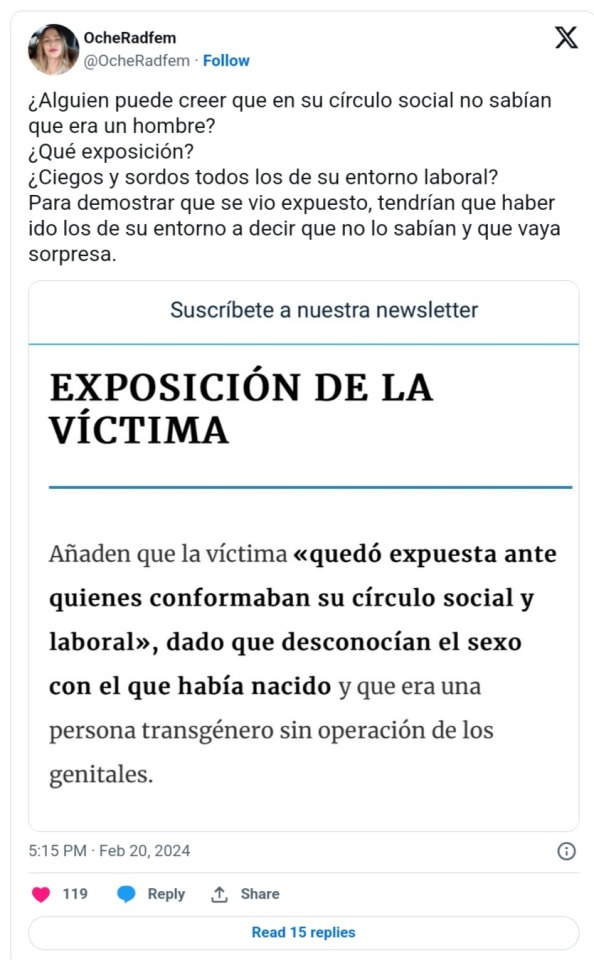
When handing down the sentence, as reported in El Periódico, the court ruled that “the derogatory statements regarding gender identity … reflect the contempt [he] feels towards the group of transgender people who have not undergone genital reassignment surgery, and show, by questioning the gender (of the victim), a clear desire to inflict ridicule, and managing to generate [in the victim] feelings of humiliation to the detriment of [his] dignity.”
P.O. accepted the sentence imposed after coming to an agreement with the prosecution and declining to defend himself.
The court decided to suspend his six-month prison sentence on the condition that he pay the victim 3,850 Euros in compensation for the “emotional damages caused.” He must also take a course on equal treatment and non-discrimination. Failure to do so could lead to incarceration.
In addition, P.O. is disqualified from holding employment in any profession in the fields of teaching or sports for three and a half years.
The law firm who assisted in the man’s prosecution boasted of their victory on social media. The firm, Olympe, specializes in LGBTQ+ matters. According to their website, they identify as feminists, LGTBIQ+ and antiracists.
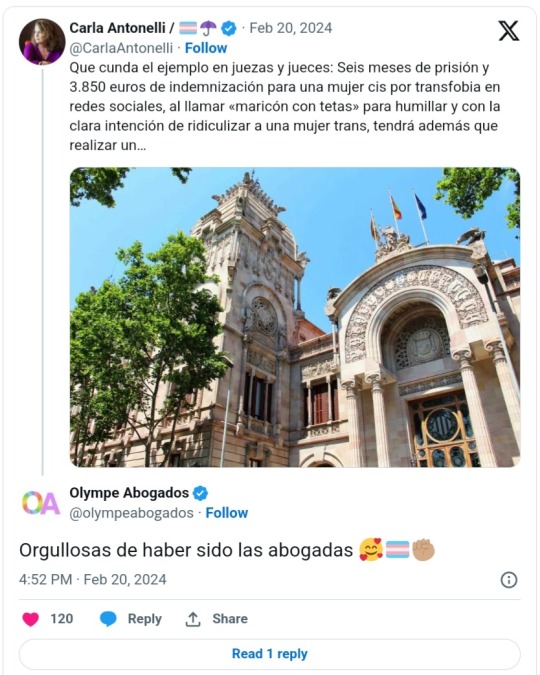
Speaking to Reduxx on the case, Spanish psychologist and author Carola López Moya, raised concerns about the fact that the media had previously referred to one of the parties in the case as a “woman,” stoking confusion and outrage. Moya is the author of “The Sect,” and was previously sued by trans activists who sought to have her removed from her profession for 5 years.
“This is an example of how the use of language far removed from biological reality generates confusion,” she said. “News media should have been talking about two males who self-identify as women from the beginning.”
On the case itself, Moya disregarded the argument between the two men as nonsensical.
“That a man believes that by amputating his genitals he is a woman… it is a sample of the dissociation that this doctrine fosters,” she said. “It instills in people a belief that it is possible to truly change their sex, and it is not.”
#Spain#Barcelona High Court#Calling a bio male a man is crime against fundamental human rights and public freedoms#Violeta Ferrer Micó is a TIM with a history of prostitution#TiritiTrans Trans Trans Trans#Trans Whoretour#TIMs glorifying ways women have been abused#I have a feeling the women around him knew#They were just too polite or too afraid of being called hateful#Trans Law#Olympe
12 notes
·
View notes
Text
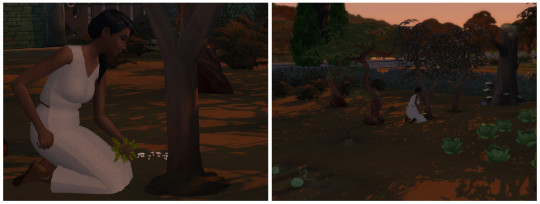

Mpatíni Kitanétou was from a very poor family. Actually it wasn't much of a family, it was just Mpatíni and her brother now. Her parents were both dead, and the last few years with their father had been so awful, that the children felt more relieved than sad when he died in an accident.

Now Mpatíni and her three years older brother Olimáchos made a living from begging, picking olives and fruits, chopping wood and other work on the farms around Manthos.

They had no permanent home, but lived on the outskirts of the village, exposed to the elements and highway robbers. It was not easy.
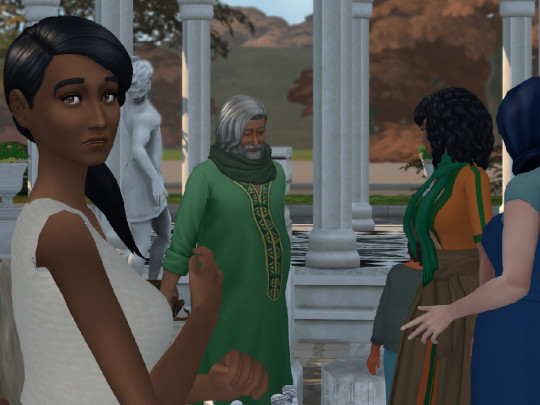
Mpatíni hated when they couldn't find work and had to go to the Agorá to beg for money or bread. She detested the overbearing glances, the vicious and stubborn rumors, gossip moving through the crowd like a hissing snake. Rumors that their mother Mpistaméni was a pythoness, and most likely a woman of the street. Oh yes, a real beauty, but probably a witch. She was said to dance in such an alluring way that men willingly gave up all their valuables and money for her. Which was quickly taken over by her ponce, supposedly their father.

Now that everybody could see that Mpatíni had inherited her mother's beauty, there were insinuations that she had followed in her mother's footsteps, and that her brother, obviously not known to be an honorable man, was poncing his own sister.
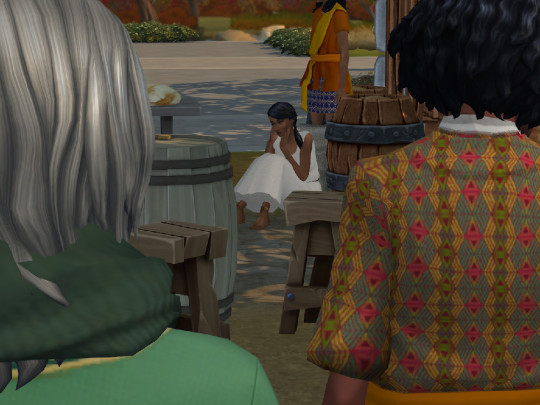
The siblings were aware of what was whispered behind their backs, and sometimes smug brats even shouted to them, but what could they do? There was no judge or court to appeal to, only the unjust and ruthless opinion of the mob, impossible to fight.

They were outcasts, no matter what the truth was. It really wasn't fair, but this was their reality, and it wasn't much they could do about it.
.
Previous | Index | Character overview | Next
#KyriaT#KyriaT-stories#Chapter Ten#ts4 story#sims 4 story#history challenge#ts4 history challenge#Generation 2#Early civilization sims#Early civ sims#Once Upon A Time#The First Ones#Mpatíni Kitanétou#Olimáchos Kitanétos#simblr#tw prostitution#tw bullying
8 notes
·
View notes
Text
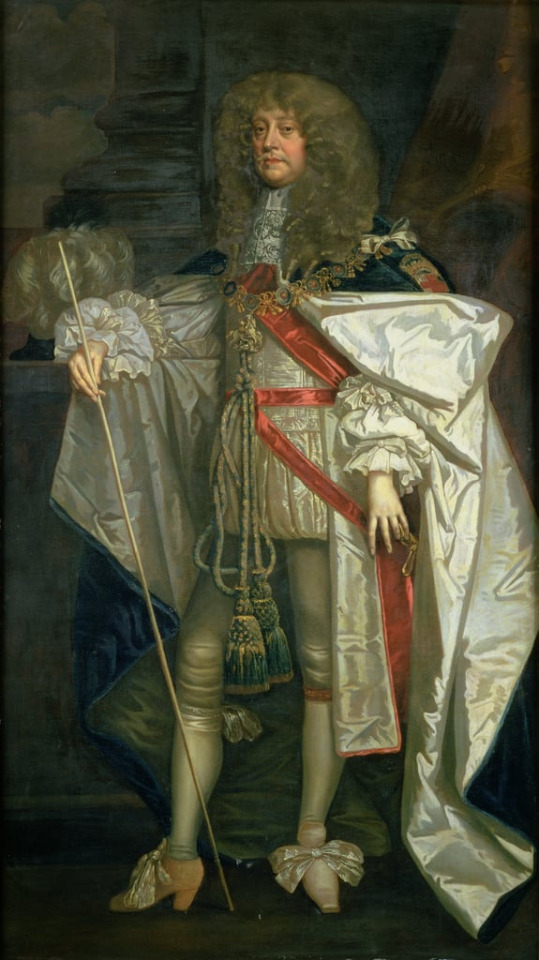
The outrageous, extravagant, often humorous, and sometimes beautiful outfits worn by the subjects of old portraits.
I'm usually meticulous about artist, title, date, and location, except this image appeared in my files with none of that information. In trying to locate something about it, I discovered some interesting information about 17th century men and their big hair.
Once again, the clap inspires a fashion trend! I wrote a bit about the codpiece and its connection to syphilis in this post. Well, lo and behold, men's wigs were not just purely a random whim of fashion. Apparently, untreated clap causes one's hair to fall out. Solution – the wig, or peruke, as it was called. Royalty could not suffer baldness for fear of ridicule. And so, what the king wore, the kingdom copied. That is, if they were of a stratum that allowed such luxuries. Since perukes were full and curly, it can be surmised that one need not be bald, necessarily but inherited the wrong type of hair. Of course, there were also gentlemen who received the gene for what is now called male pattern baldness. In contrast, Elizabethan era (16th century) women shaved their hairline in step with the look of the Queen, who was losing her hair naturally. Go figure.
Syphilis was running rampant through Europe and so was a sex trade. In London, the theaters in Covent offered gentlemen not only stage entertainment but also a shag, if they were so inclined. Which they were – frequently and in large numbers. The sex workers were dubbed The Nuns of Covent and entire booklets were available at the theater venue (during intermission or after the show) with reviews of the ladies' work and other information.
Harris’s List of Covent Garden Ladies’, an annual directory of prostitutes working in London published from 1757 to 1795, was a Georgian bestseller. A small guide book, it was printed and published each year at Christmas and sold for two shillings and sixpence.
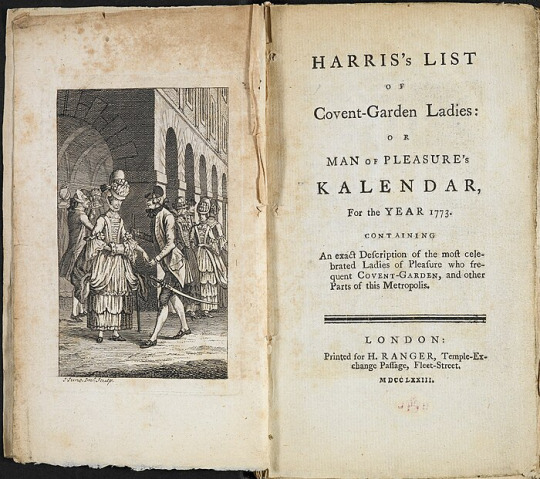
Sources:
Covent GardensMemories
Historic UK
Wikipedia
#portrait#the resplendent outfit#art#painting#unknown artist#prostitution in 17th century britain#british history#harris's list#syphilis#perukes#17th century fashion#big hair wigs#history of fashion#historical fashion trends#fashion history#covent garden
11 notes
·
View notes
Text
"Tokugawa rulers organized prostitution, establishing licensed pleasure-quarters. Yugo, women of pleasure, were confined to such districts in Kyoto, Osaka, and Edo. By 1679, Japan had over a hundred such quarters. When farming suffered in the seventeenth century, peasants sold their daughters and sisters into prostitution. An influx of male officials and bureaucrats in cities created a huge demand for whores, ranging from skilled courtesans who chose their customers to ordinary prostitutes obliged to have sex with any man who paid them. Girls were indentured until a certain age (usually twenty-seven), when they could leave and set up in business for themselves, marry or become a man's lover. Some were only children when they were sold by destitute fathers to owneres who raised and educated them. Little is known about the many male prostitutes."
-p.91 of 'From Eve to Dawn, A History of Women in the World, Volume II: the Masculine Mystique' (French, Marilyn)
61 notes
·
View notes
Note
It always makes me laugh to think that the Apostle Paul's Hebrew name is Saul and his Roman name is Paul. Considering that Jesus healed the centurion's servant, he had no interest in homophobia, but considering that Paul left that infamous homophobic letter…
Paul (Saul): I don't know why, but I feel like I lost my crown, which I never had, because of my gay son and bisexual son-in-law.
Hehe, I'm going to dump my knowledge of the Bible now! XD
I guess the 'infamous homophobic letter' you mentioned is the Corinthians, right?
Paul says that individuals who continue in sinful behavior will not attain heaven and among these 'sinners' were drunkards, people who bangs alot, and cheaters. He also references two Greek words that many translate and associate as expressions of same-sex behavior. These two words are malakoi and arsenokoitai.
Of course, these are the words throughout history that translators have had the worst time translating, and of course, homophobes change the meanings of what these words actually means.
Malakoi directly translates into 'soft,' and it was usually used to describe someone who lacks self-control and is weak, cowardly, and lazy.
Of course, people being sexist and all translate this word to 'effeminate' instead. Because women are lazy and cowards, I suppose... 🙄 Instead, the word doesn't really have anything to do with gay men, but it could have a connection when you use the word in a sexual context. However, that word is frequently used to describe men who were seen as lacking self-control in their love for... women.... For the past centuries, English translations used the word 'weaklings'. It's only in the past century that they connected the word with same-sex relationships instead.
Arsenokoitai comes from two Greek words: arsen (male) koites (bed). This is the word that makes many speculate that this term was used to condemn same-sex behavior. Alas again! CONTEXT 👏 ALWAYS 👏 MATTERS! 👏 The word likely relates to sexual or economic exploitation, due to in ancient literature, the word only appears in lists of vices. Some historians even think that this was about temple prostitution. So yeah, it probably relates to same-sex behavior, but not in a consensual way.
And then we have the whole deal that many people points out... The dude was a Roman who could speak Greek... Why didn't he just use the words Erastes and Eromenos if he wanted to be really clear to condemn same-sex behaviors? Malakoi and Arsenokoitai have never really been used as a pair by other ancient writers.
So again, why didn't Paul just use the already existing term that was associated with same-sex behaviors? Why not the latter? Hmmm... Mystery.... 😶
And I'm not going to talk about the Romans letters because there he just slut-shaming EVERYONE!
I'm definitely wanna/gonna talk about Paul's sexuality! But that will be later... I need to rest!
(ps. I don't really know if you even wanted to know this, but here we are... I also feel like I spiraled a bit… Sorry!)
#tw mentions of prostitution#queer christianity#new testament stuff I supossed?#AnniAsks#AnniRambles#Ancient Queer History
13 notes
·
View notes
Text
HL OC: Oleana
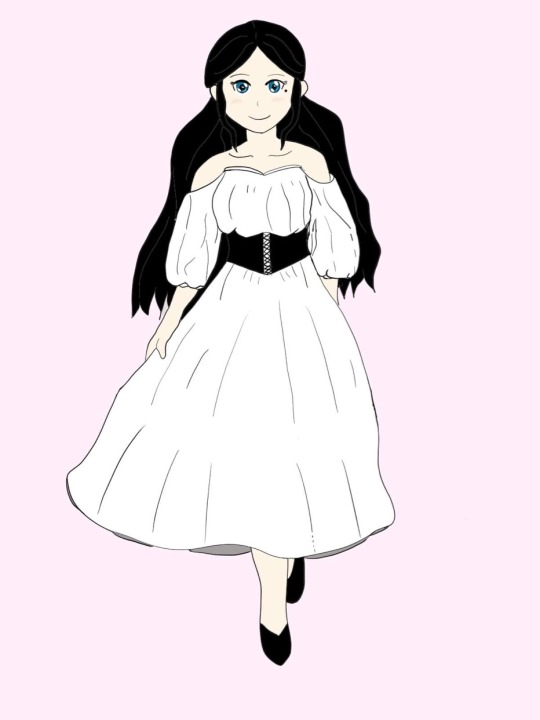

Introducing my Hogwarts Legacy OC Oleana!
TRIGGER WARNING: Historical depictions of prostitution. Please be warned before you proceed, but know that she is not traumatized, she is away from that experience & living her best life.
Bio:
Oleana was born and raised in the alleyways in the depths of the dark side of Hogsmeade, close to the Hog's Head Inn. She doesn't know who her parents are so she was raised by the other girls in her profession, one of which used to be in a higher class. They taught her to read and write. Her name comes from a book on Herbology and poison they gave her to practice reading with, coming from the Oleander or Nerium plant—a pretty but poisonous plant. This routine continued until she turned 11, having to begin earning her keep in the streets.
She lived her life like that for years until she was 15. Despite this, she has always been cheerful and kind, with a curious mind and playful flirty nature. She didn't think much of her life, thinking it was just her lot, but she did look at the Hogwarts students that came to Hogsmeade from afar from her place in the alley, wondering what it was like to be like them. Her life continued until one day she offered her services to a man who turned out to be Professor Sharp.
Instead of accepting them, he told her to come with him to his office at Hogwarts & to her surprise, she was offered a place as a student. She would have to do menial chores around the castle to cover for her lack of funds, seeing as how she spent them on being able to live and have books. Full of surprise and wonder, she accepts his offer and is sorted into Ravenclaw. She is finally going to be a normal teenager and a student at Hogwarts, just like the people she's seen before. Professor Sharp is like a father to her and finds her too adorable for words. He fangirls over her cuteness, which she enjoys. Her excitement and curiosity is so overpowering that one day she ran barefoot into the forbidden forest to meet a hippogriff. She finds one & does a mixture of a bow and curtsy, and soon befriends it. She has a thirst for knowledge & no boundaries on what is acceptable, so she often puts herself in sudden situations just to satisfy her curiosity.
She is 15 because the MC is 15 (she is not the MC, she has no ancient magic) and so that she can have a few years as a student so she can learn and meet people her age more naturally. I didn’t want to bend too many rules when creating her for this world. I wanted her to kind of fit it, like my other characters. I did not go into this wanting her to be a child. This started off as a self insert character ai chat with Professor Sharp and she has become her own character. I love her so much she's my baby 🥹 I hope I haven't offended anyone with her, but please let me know if I have.
#harry potter#hogwarts legacy#hogwarts legacy mc#hogwarts legacy oc#hl mc#hl oc#harry potter oc#hogwarts legacy fandom#hogwarts legacy fanart#Oleana#Oleana Sharp#aesop sharp#professor sharp#trigger warning#historical depiction of prostitution#I’m sorry I love British history okay
4 notes
·
View notes
Text
I finished my first book of 2023 which was The Murder of Helen Jewett by Patricia Cline Cohen. I think I'd like to read more by her, even just small publications, because she's thorough and fairly academic without being jargon-laden and impenetrable. Again, I draw a comparison (probably because of the similarity of the subject matter) to The Five by Hallie Rubenhold, which swings to the other end of the spectrum in terms of being "poppy" and more political in interpretation. That doesn't mean I even disagree with Rubenhold, just that you can tell the intended audience.
Cohen avoids making any sweeping interpretations. She does talk where appropriate about class, sex, and race privileges but she's not really concerned with either tying the murder into a narrative about the history of women, or into a narrative about the history of news media, or etc. She focuses much more on talking about the actual details of the murder itself, drilling down through layers of obfuscation and using primary sources to document what actually (or "actually," if you prefer) happened. She gives biographical sketches of multiple figures involved in the events, including Jewett, but the information is necessarily thin and filled in with cultural/historical context because so little is actually known.
Since she doesn't want to tie into any big narratives, I'll do it for her: it's interesting how our language around men and their culpability for male violence really hasn't changed since the 1830s. The fundamental argument around Robinson, who was unequivocally guilty of the crime and yet was acquitted, was "he's just a little boyyyyyyy he's just a little birthday boyyyy y :(". One argument that Cohen does make is that what was so disturbing about the trial was that it pulled back the veil on male privilege and showed its inner workings: a newspaper of the time joked that Robinson had 6 lawyers, his 3 actual lawyers and then the DA, the assistant DA, and the judge presiding on the case, who almost verbatim told the jury to disregard the testimony against Robinson (from prostitutes*) and focus on that given by reputable people, i.e. the men who closed ranks to protect him.
In so many ways, these cultural mechanisms are still in action; they're just buried under various layers of apparent reform or, on a social level, fake-wokeness.
#*i prefer not to use the term 'sex worker' for any historical personage#i don't think it accurately reflects the life circumstance of the majority of women engaged in prostitution throughout history#that's not intended as a knock on these women or to imply that they were not agents#but 'sex worker' implies a specific political framework that i don't think is accurate for analysis most historical circumstances#*analyzing#anyway
13 notes
·
View notes